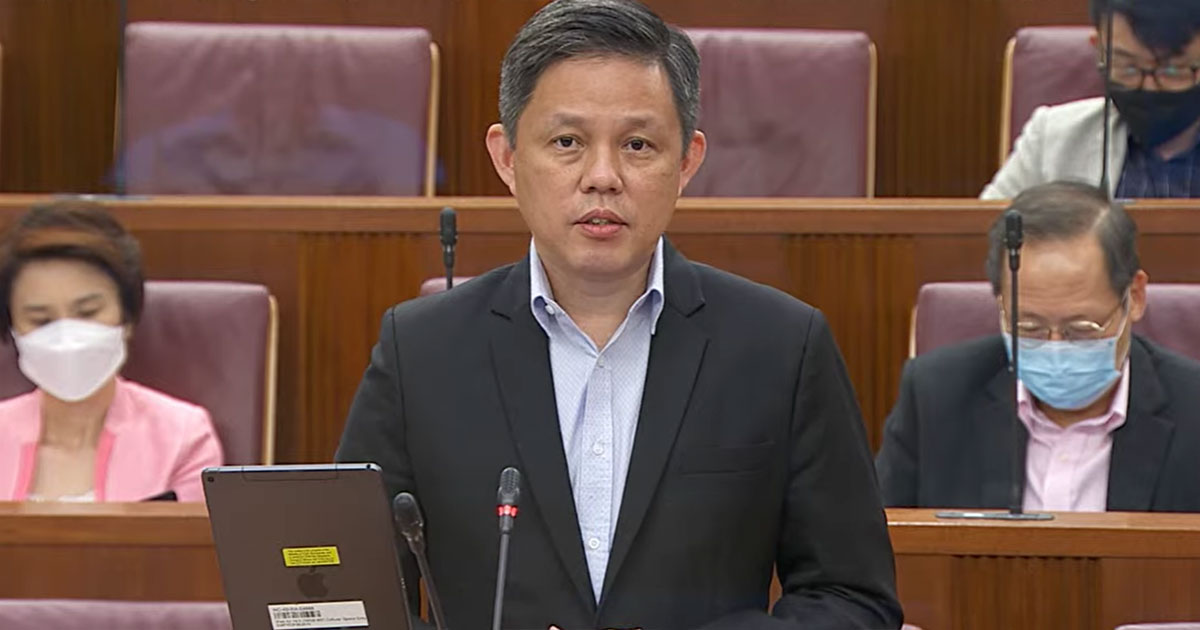Minister for Trade and Industry (MTI) Chan Chun Sing gave his Committee of Supply (COS) debate speech on the afternoon of Mar. 2, 2021.
In response to discussions on how to use the reserves and how to do more for various groups in the society, Chan said that we shouldn't lose sight on how we "need to earn our keep" as we are still trying to get out of "the most serious economic recession since independence".
Not returning to pre-Covid world
"We are not returning to a pre-Covid world," he said.
He added that even if Singapore's gross domestic product (GDP) returns to pre-Covid levels quantitatively, the economy will be qualitatively different by then.
This includes the share of sectors and industries, the types of products and services we manufacture and trade with the world, and the types of skills we need to earn.
Singapore has to start building a new economy now, Chan said.
Turning challenges into opportunities
However, there are many challenges including:
- Concerning geopolitical tensions
- Accelerating technological disruptions
- The mutating Covid-19 virus and the uneven pace of vaccine rollouts
- Global supply chains are being reordered and reconfigured, not always for economic reasons
- The rules-based global trading order, underpinned by the proper functioning of the World Trade Organisation
To remain competitive and relevant despite these challenges, Chan suggested to turn them into opportunities by:
- Being a safe harbour for capital, talent and ideas in an uncertain world.
- Being a connected, trusted and resilient node in order to serve different markets in a bifurcating and fragmenting world.
- Embracing new technologies to be the disruptor rather than to be disrupted.
- Mastering digitalisation to transcend the constraints of Singapore's size and geographical location.
- Leveraging Singapore's small size to pivot faster and more nimbly than competitors.
He also shared three broad strategies which Singapore has to execute:
1) Strengthen Singapore's position as a global hub for business and technology
In 2020, Singapore has attracted investment commitments of about S$17.2 billion in Fixed Asset Investments and S$6.8 billion in Total Business Expenditure.
These, according to Chan, are votes of confidence and faith in Singapore.
To distinguish Singapore in a global class of the few high-quality and high-trust business hubs, he suggested:
- Clear, transparent, consistent and coherent legal and policy frameworks to do business
- Progressive rules to enable new business models to thrive
- Superior networks that will give Singapore denser and more secure connections with the world, allowing global businesses to operate out of Singapore
- A mix of local and global talent to serve global markets
- Entrenching critical parts of the research and development value chains so businesses will include Singapore as part of their global innovation networks, even in times of crisis
2) Entrench ourselves as a critical node in global value chains that would make Singapore hard to displace
Singapore will need to pursue critical capabilities needed to anchor ourselves in every industry that we choose to compete in, Chan said.
In a globalised world, it is easy to be dis-intermediated and displaced by cheaper competitors or digital platforms.
He added that Singapore has to become the exchange that adds value through ways like the provision of complementary services.
3) Deepening corporate capabilities and workers' skills
Singapore will spare no effort to help the enterprise and workers acquire new and better capabilities to compete, said Chan.
He said there are different schemes to help companies of various sizes because their needs are different.
The goal for large enterprises is to help them compete globally by providing access to superior trade networks, research and development and talent networks.
Such support would see Singapore help by providing growth capital and support for the commercialisation of research and development.
The goal for medium-sized enterprises, on the other hand, is to have more of them and bulk them up to compete in niche areas.
Recounting the initiatives, Chan singled out programmes like Scale-up SG and Enterprise Leadership Transformation that will help to build deep capabilities for them to compete on a global scale.
For small and micro-enterprises, he said it is important to provide them with shared and digital platforms to improve their productivity and efficiencies by accessing shared capabilities.
Top image screenshot from MCI's YouTube page.
If you like what you read, follow us on Facebook, Instagram, Twitter and Telegram to get the latest updates.
